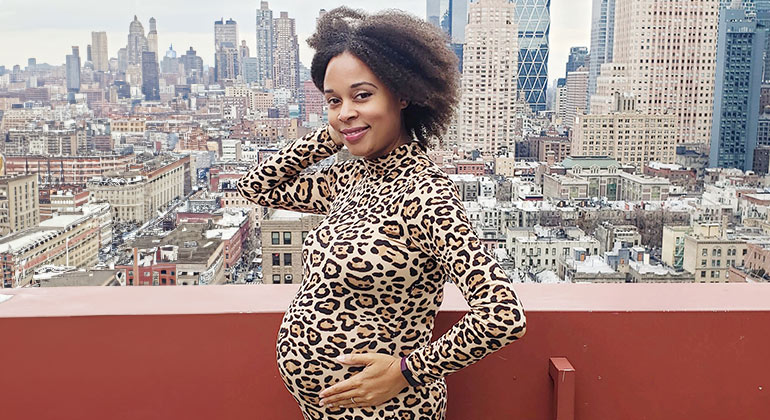
Safiya Mom of Twins Seeks to Inspire, and Raise Awareness of Black Maternal Health
Any way you look at it, Safiya’s labor and delivery was a success story. At 40 years old, she gave birth to healthy twins, a girl and a boy, at 37 ½ weeks on Christmas Eve in 2023. “They were the best Christmas gift I ever received,” says Safiya. Each twin weighed about five pounds, they were born vaginally, and they didn’t need a stay in the intensive care unit—they were perfect and healthy just like their 2-year-old brother.
Safiya is especially grateful because her pregnancy was considered high risk due to her age and the fact that she was carrying twins. As a Black woman and health advocate, she was also aware of the worrisome statistics for Black pregnant people. According to the Centers for Disease Control and Prevention, Black women are three times as likely to die of a pregnancy-related condition as their white counterparts. These statistics are among the worst in the developed world, experts say. Black women have higher rates of conditions including pre-eclampsia, gestational diabetes, and heart conditions such as hypertension and blood clots. Reasons for these comparatively poor outcomes include systemic racism and implicit bias, reduced access to reproductive health care services, and socioeconomic and insurance disparities.
These statistics weren’t just theoretical for Safiya. “I personally know several Black mothers with such stories,” she said. “Even some of my non-Black friends had experienced high risk, urgent, and downright scary situations that required emergency interventions, causing them stress, anxiety, and sometimes PTSD.”
Self-Care and Self-Advocacy
To improve the odds throughout her pregnancy, Safiya practiced a healthy amount of self-care and self-advocacy. She chose Mount Sinai West for her first child because it had an excellent reputation, was welcoming, and came with positive recommendations from friends. She chose an obstetrician who is Black, Valerie Lewis-Morris, MD, Assistant Professor of Obstetrics, Gynecology and Reproductive Science, Icahn School of Medicine at Mount Sinai.
Safiya explains, “She is an African American woman like me, and I felt like she understood me and my concerns as a Black woman. I also liked that she had plenty of experience and was on the faculty at the medical school.” For Safiya’s second pregnancy, she remained with Dr. Lewis-Morris, opting to stick with what had worked so well the first time.
Safiya also enlisted the services of a doula, to support and advocate for her. She made sure she was never by herself while in the hospital. And she made a point to educate herself thoroughly, by taking classes and researching certain aspects of her pregnancy. “She walked into every appointment knowing what information she needed,” says Dr. Lewis-Morris. “The discussions were always focused.” In addition, Safiya outlined her wishes in a birth plan that noted her preference for a vaginal birth. “Most people assume that twins can only be born via C-section, which is not the case,” Safiya explains.
Even though Safiya’s pregnancy was considered high risk, Dr. Lewis-Morris wasn’t particularly worried about her. For starters, Safiya’s first pregnancy was full-term and delivered vaginally, paving the way for a second vaginal delivery. Beyond that, Safiya was healthy and ate well. She exercised regularly before the pregnancy and maintained her habit of walking and taking fitness classes throughout the nine months.
Still, Dr. Lewis-Morris took special precautions, mostly because of the twins. In addition to Dr. Lewis-Morris, Safiya regularly saw a specialist in Maternal Fetal Medicine, a team with expertise in high-risk pregnancy. During the third trimester, Safiya had many more doctor and sonogram appointments than she would have if she’d only been carrying one baby. The consummate juggler, Safiya kept up with everything—appointments, exercise, self-education, and taking care of her toddler son—while working full-time as a lawyer and public health advocate.
An Uplifting Pregnancy
Safiya was pleased with the care she received at Mount Sinai West, both for her older son and for her twins. “I adore everything about Dr. Lewis-Morris,” Safiya says. “She is extremely competent, intelligent, funny, helpful, patient, and she really cares about her patients and her work.” Safiya appreciates more than just her doctor. “Dr. Lewis-Morris works with an excellent medical team at Mount Sinai that have worked together for years and all practice medicine with the same philosophy of placing the patient's needs and preferences first, whenever possible. I felt like I could advocate for myself—and they listened.” Safiya also likes the consistency in care. “I was helped by the same awesome OBGYN resident, Ethan Nyein, MD, during both of my stays at Mount Sinai.”
This doesn’t mean having twins was no different than a single birth. Safiya had more symptoms with the twins than she’d experienced the first time around. “But every time a really bad symptom came up—nausea, indigestion, acid reflux, insomnia—the doctor was able to help me take care of it.”
The biggest challenge was getting enough sleep and consuming enough calories to feed two growing babies. Safiya’s number-one lesson is the importance of self-education. “I did my research and took classes on what to expect.” And education also means asking questions of your doctors. “Don't be afraid to ask questions at every appointment,” Safiya advises. “One time I had 25 questions for my doctor.” She informed Dr. Lewis-Morris in advance and they set aside extra time to talk. “I also emailed the questions in advance.” Her objective was to get all the information she needed and all of her concerns addressed. “You need to understand what's going on, be comfortable with the process and be aware of your options,” adds Safiya.
Safiya hopes her healthy pregnancy will encourage other would-be mothers. “I want to inspire other pregnant women who are starting their journey to motherhood and doing their research to know that despite the statistics there are positive stories out there, so remember to focus on creating your own uplifting pregnancy and birth experience.”